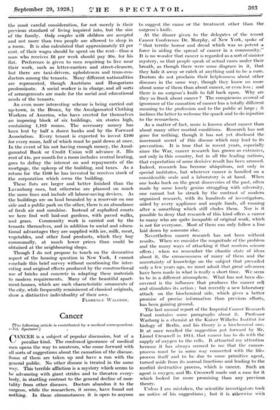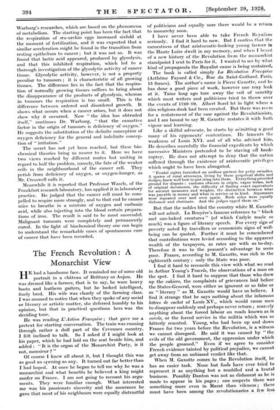Cancer
[The following article is contributed by a medical correspondent. --Ed. Spectator.]
CANCER is a subject of popular discussion, but of a peculiar kind. The confessed ignorance of medical men opens the way to amateurs, who come forward with all sorts of suggestions about the causation of the disease. Some of them are taken up and have a run with the general public. No other disease is treated in the same way. This terrible affliction is a mystery which seems to be advancing with giant strides and to threaten every- body, in startling contrast to the general decline of mor- tality from other diseases. Doctors abandon it to the surgeon, while the researchers, it seems, have found out nothing. In these circumstances it is open to anyone to suggest the cause or the treatment other than . the surgeon's knife.
. At the dinner given to the delegates of the recent Cancer Conference Dr. Murphy, of New York, spoke of " that terrific horror and dread which was so potent a force in aiding the spread of cancer in a community." It is no wonder that cancer is regarded as a sort of sinister mystery, so that people speak of actual cases under their breath, as though there were some disgrace in it, that they hide it away or catch at anything said to be a cure.
Doctors do not proclaim their helplessness about other diseases in the same way, though they know no more about some of them than about cancer, or even less ; and there is no surgeon's knife to fall back upon. Why are they so frank about cancer ? The conspicuous avowal of ignorance of the causation of cancer has a totally different meaning to the profession and to the public at large ; it inclines the latter to welcome the quack and to do injustice to the researchers.
As a matter of fact, more is known about cancer than about many other morbid conditions. Research has not gone for nothing, though it has not yet disclosed the innermost secret of this disease which may lead to its prevention. It is true that in recent years, especially since the War, cancer research has grown so extensive, not only in this country, but in all the leading nations, that expectation of some decisive result has been aroused. Indeed, research has become ubiquitous, not only in special institutes, but wherever cancer is handled on a considerable scale and a laboratory is at hand. When one looks back on the great discoveries of the past, often made by some lonely genius struggling with adversity, one cannot but be struck by the contrast of modern organized research, with its hundreds of investigators, aided by every appliance and ample funds, all running after a something which still eludes them. Nor is it possible to deny that research of this kind offers a career to many who are quite incapable of original work, which is not for everyone. Most of them can only follow a line laid down by someone else.
Nevertheless cancer. research has not been without results. When we consider the magnitude of the problem and the many ways of attacking it that modern science offers ; when we remember the chaotic state of ideas about it, the erroneousness of many of them and the uncertainty of knowledge on the subject that prevailed only a few years ago, we must admit that great advances have been made in what is really a short time. We seem to be in a different atmosphere. What has not been dis- covered is the influence that produces the cancer cell and stimulates its action ; but recently a new laboratory attack on the biochemical side, which gives a better promise of precise information than previous efforts, has been gaining ground.
The last annual report of the Imperial Cancer Research Fund contains some paragraphs about it. Professor Warburg is a chemist at the Kaiser Wilhelm Institut for biology of Berlin, and his theory is a biochemical one. It at once recalled the suggestion put forward by Mr. Lionel Cresswell in 1914, that cancer has to do with the supply of oxygen to the cells. It attracted my attention because it has always seemed to me that the cancer- process must he in some way connected with the life- process itself and to be due to some primitive agent, turned aside from its normal functions and leading to the morbid destructive process, which is cancer. Such an agent is oxygen, and Mr. Cresswell made out a case for it which looked far more promising than any previous theory.
Unless I am mistaken, the scientific investigators took no notice . of his suggestions ; but it is otherwise with Warburg's researches, which are based on the phenomena of metabolism. The starting point has been the fact that the respiration of sea-urchin eggs increased sixfold at the moment of fertilization, and it was expected that a similar acceleration might be found in the transition from resting epithelium to cancer ; but it was not so. It was found that lactic acid appeared, produced by glycolysis, and that this inhibited respiration, which led to a thorough investigation of the glycolytic activity of cancer tissue. Glycolytic activity, however, is not a property peculiar to tumours ; it is characteristic of all growing tissues. The difference lies in the fact that the respira- tion of normally growing tissues suffices to bring about the disappearance of the products of glycolysis, whereas in tumours the respiration is too small. This is the difference between ordered and disordered growth. It shows what occurs when a cancer arises, but it does not show why it occurred. Now " the idea has obtruded itself," continues Dr. Warburg, " that the causative factor in the origin of tumours is deficiency of oxygen." He suggests the substitution of the definite conception of oxygen deficiency for the general and indefinite concep- tion of " irritation."
The secret has not yet been reached, but these bio- chemical theories bring us nearer to it. Here we have two views reached by different routes but uniting in regard to half the problem, namely, the fate of the weaker cells in the neighbourhood of the cancer cell. They perish from deficiency of oxygen, or oxygen-hunger, as Mr. Cresswell calls it.
Meanwhile it is reported that Professor Wasels, of the Frankfurt research laboratory, has applied it in laboratory practice. He judged that the cancer cell must be com- pelled to respire more strongly, and to that end he caused mice to breathe in a mixture of oxygen and carbonic acid, while also injecting into the blood certain prepara- tions of iron. The result is said to be most successful.
Malignant tumours were completely and permanently cured. In the light of biochemical theory one can begin to understand the remarkable cases of spontaneous cure of cancer that have been recorded.





































 Previous page
Previous page